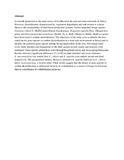Resource information
Livestock production is the main source of livelihood in the arid and semi-arid lands in Africa. However, desertification characterized by vegetation degradation and soil erosion is a major threat to the sustainability of land-based production systems. Native rangeland forage species Cenchrus ciliaris L. (Buffel grass/African foxtail grass), Eragrostis superba Peyr. (Maasai love grass) and Enteropogon macrostachyus (Hochst. Ex A. Rich.) Monro ex Benth. (Bush rye grass) have been used to combat desertification. The objectives of the study were to identify the best-suited native grass species to combat desertification in a semi-arid environment in Kenya and to identify the preferred grass species among the agropastoralists in the area. Percentage basal cover, plant densities and frequencies of the three grasses in pure stands and mixtures were estimated. Grass species preferences were through household survey and focus group discussion. Results showed a significant difference (P < 0·05) in plant densities and cover estimates: E. macrostachyus was ranked first; C. ciliaris and E. superba were ranked second and third respectively. The agropastoral farmers, however, preferred E. superba followed by C. ciliaris and E. macrostachyus, a reverse trend. These results suggest that the choice of grass species to combat desertification is influenced more by its contribution as a source of forage for livestock than its contribution for rehabilitation purposes.


